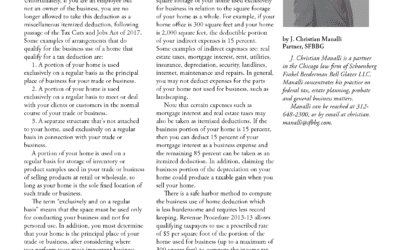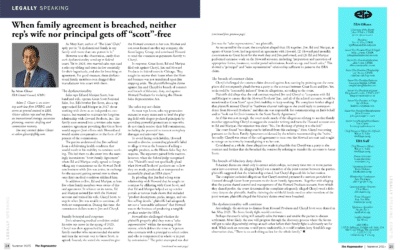Under a new law (35 ILCS 200/9-275), the Cook County Assessor is hunting for homeowners who are claiming property tax exemptions for which they do not qualify. The consequences can include repayment of up to 6 years of unpaid tax, plus 10% interest per year plus a penalty of 50% of the total unpaid tax. Moreover, the Assessor is authorized to record liens against real estate if the homeowner does not pay as required.
The Illinois Property Tax Code allows for partial exemptions (AHomestead Exemptions@) from property tax for certain qualifying individuals. (35 ILCS 200/15-165, et seq.) These exemptions include the General Homestead Exemption, Senior Citizen Exemption, Senior Freeze Exemption and Returning Veteran Exemption, among others.
Perhaps the best known and most widely applied exemption is the General Homestead Exemption. This exemption is available to owners who occupy a home as their principal residence (and to the lessee of a home who is responsible for payment of the property taxes). However, the General Homestead Exemption is limited to Aone per customer.@ (Married persons living in separate homes may split one General Homestead Exemption.) If a person claims more than one such exemption (e.g. on a second home in Florida) the second exemption is a violation of law and subjects the taxpayer to various penalties.
The General Homestead Exemption is equal to the amount by which the current assessment has increased over the 1977 assessment up to certain limits. In Cook County, the maximum General Homestead Exemption is currently 7,000 in equalized assessed valuation.[1] Multiplying 7,000 by the local tax rate produces the maximum amount of tax saved by the General Homestead Exemption. For example, if your local tax rate is 10%, then the maximum value of the General Homestead Exemption is 7,000 x 10% or $700 in tax savings.[2]
When a taxpayer receives a notice of assessment in a general assessment year,[3] the notice should include any Homestead Exemptions that are being applied to the real estate. If the taxpayer finds that he received an exemption for which he is not qualified, the taxpayer must report such exemption within 60 days and pay any tax and interest for prior years (up to certain limits) in which the exemption should not have applied. While the law creating the various Homestead Exemptions is the same everywhere in the State of Illinois, a new statute gives the Cook County Assessor (but not other assessors) the authority to enforce the law. If the Assessor believes that a taxpayer has received exemptions for which he is not eligible, then the Assessor may issue a notice of intent to record a lien against the real estate. This notice includes a demand for payment of tax, plus any interest and penalty, and is mailed to the owner of record and to the person to whom the last tax bill was sent. If the taxpayer does not pay the amount demanded, then the Assessor may record a lien against the property 60 days after the notice is served.
If the taxpayer disputes the claims in the notice of intent to lien, he may request a hearing within 30 days of receiving the notice at the Assessor=s newly created Department of Administrative Hearings. In this new department of the Assessor, attorneys appointed as administrative law judges will determine whether the taxpayer improperly received exemptions and, if violations are found, assess any unpaid taxes, interest and penalties. If the taxpayer is found to have claimed no more than 2 exemptions improperly, then the Assessor may require payment of unpaid taxes plus 10% interest over only the prior 3 years. However, if the taxpayer if found to have claimed more than two exemptions improperly, the Assessor may require payment of the tax, plus interest, plus a penalty of 50% of the unpaid tax, over the prior 6 years. (The Cook County Assessor keeps any penalty payments.) If the taxpayer does not pay the judgment within 30 days, interest accrues and the Assessor will record a lien against the property. The decision of the administrative law judge can be appealed to the circuit court under the Illinois Administrative Review Law.
Other states, Florida for example, notify assessing officials in Illinois when a taxpayer is found to have claimed exemptions in more than one state. In addition, assessors use computerized research services to review public records and gather information. The Cook County Assessor reports that he has already collected millions of dollars in unpaid taxes and penalties although he has just begun enforcement of the new law. Taxpayers should be careful to ensure that any applications for Homestead Exemptions (General, Senior Citizen or others) are correct and that they are not receiving the benefit of Homestead Exemptions for which they are not eligible.
[1]
The equalized valuation is the assessment of the property multiplied by the equalization factor or AMultiplier.@ The equalization factor for each county is determined by the Illinois Department of Revenue by comparing sales prices reported on Transfer Tax Declaration Forms to actual property assessments. The equalization factor is supposed to correct for underassesssments by multiplying the assessed value by the equalization factor to produce an AEqualized Assessed Value.@ The 2012 equalization factor (last available) in Cook County is currently 2.8056.
[2]
Property Tax = (assessed value) (equalization factor) (tax rate). Everywhere in Illinois except Cook County, the assessed value is one-third of the market value of the real estate. In Cook County, the assessed value of residential property is 10% of market value and the assessed value of commercial and industrial real estate is 25% of market value.
[3]
Property in Cook County is scheduled for reassessment once every three years. Properties in other counties are reassessed once every four years. Assessors are, however, permitted to reassess property in any year upon proper legal notice of the reassessment.



